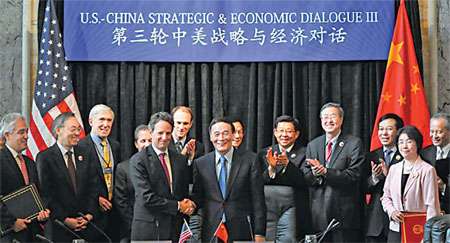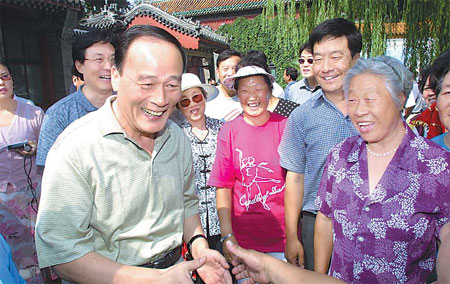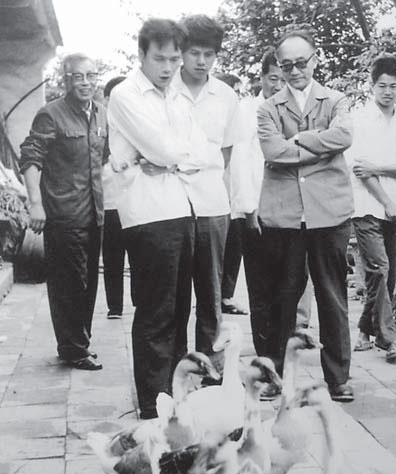Wang Qishan: Rise of a troubleshooter
Updated: 2012-12-26 07:13
By Xinhua (China Daily)
|
||||||||
|
Wang Qishan attends a signing ceremony of the 3rd round of the China-US Strategic and Economic Dialogue in May 2011. |
|
Wang Qishan spends the weekend with Beijing residents in Beihai Park during the severe acute respiratory syndrome prevention and control period in Beijing on June 28, 2003. Photos by Xinhua |
|
Wang Qishan accompanies leaders from the Rural Policy Research Office of the Secretariat of the Central Committee of the Communist Party of China to Putian, Fujian province, in May 1982, to prepare for the draft of the first central policy document in 1983. |
"He can do it" was many observers' comment when Wang Qishan took up a challenging new mission last month to lead China's top discipline watchdog amid rising calls for a crackdown on corruption.
Just over a month into his new role, Wang has demonstrated the same style that previously won him fame as a troubleshooter in the economic field: tough, resolute and confident in the face of difficulties.
"The ethics of the Party determine its survival or demise," Wang told a symposium at the end of November, two weeks after he became the Party's anti-graft chief, or secretary of the Central Commission for Discipline Inspection of the Communist Party of China.
"In the fight against corruption, we cannot attain our goal at one stroke. We must convince the public that we are making more and more concrete efforts and delivering more and more powerful blows," he said.
At the symposium, Wang asked his guests to forget empty formulas and go straight to the point. He also encouraged them to forget their prepared speech manuscripts and show their keen insights.
"Please feel free to speak out about what you want to say," Wang told the attendees.
Troubleshooter
Wang's star rose with the fall of China's inflation. He and his team faced a tough challenge when he became vice-premier in charge of finance and trade in 2008: to tame rising inflation while maintaining economic growth. China's consumer price index rose to an 11-year high of 7.1 percent in January 2008, becoming a top concern for the government.
To make matters worse, the global financial crisis started to sweep the world at the end of that year, creating an adverse external environment for the Chinese economy.
The CPI dropped to a 33-month low of 1.7 percent in October this year.
Wang, born in July 1948, was elected a member of the Standing Committee of the CPC Central Committee's Political Bureau, China's top political authority, and appointed chief of the Party's anti-graft body last month, just a few days after the October inflation index was announced.
The other six members of the Standing Committee are Xi Jinping, who was also elected general secretary of the CPC Central Committee, as well as Li Keqiang, Zhang Dejiang, Yu Zhengsheng, Liu Yunshan and Zhang Gaoli.
Wang was first noticed by the international financial community in 1998, when he became executive deputy governor of southern China's Guangdong province to straighten widespread financial disorder there.
The toughest test for Wang was to tackle the payment crisis of the non-banking financial institutions in Guangdong, which had total liabilities of more than 100 billion yuan.
As Wang proposed, Guangdong International Trust and Investment Corporation, which was then the second-largest trust company in China and was at the center of the crisis, was declared bankrupt, and Yuehai Business Group was regrouped.
The move prevented further excessive lending in Guangdong and helped maintain the government's credit. The debt crisis was cleaned up three years later.
As former US treasury secretary Henry Paulson put it, "Wang managed the largest bankruptcy restructuring in China's history in 1998 and thereby prevented a banking crisis that could have crippled the country's growth."
His prowess as a problem solver, however, goes beyond the financial community.
Wang was transferred to Beijing in April 2003 to replace mayor Meng Xuenong at a time when an outbreak of the severe acute respiratory syndrome had claimed more than 100 lives across the country, with many cases in the city.
Once he arrived in the capital on April 22, Wang went to markets and pharmacies to investigate the problem of food and medicine shortages as a result of the epidemic-triggered widespread scare.
The municipal government issued an order the next day, introducing strict screening and quarantine measures to stem contamination channels.
The first executive meeting of the municipal government after Wang took office lasted only 30 minutes. Wang began the meeting with a warning: "Let's take what we say here seriously."
The construction of a hospital for epidemic emergencies started the same day.
The epidemic was brought under control one month after Wang took office in Beijing. His weight, however, dropped 10 kg in the first half-year he worked in the city.
As executive chairman of the organizing committee of the 2008 Olympic Games when he served as Beijing mayor and director of the organizing committee of the Shanghai World Expo when he served as vice-premier, Wang also made painstaking efforts and contributed wisdom to the two events that grabbed global attention.
Skilled negotiator
As vice-premier in charge of external economic affairs, Wang and his team have maintained close contact with their foreign counterparts to seek common ground in dealing with the global financial crisis and the European debt crisis.
As Paulson's counterpart in the China-US Strategic Economic Dialogue, Wang impressed the US negotiator as a man who "enjoys philosophical debates and has a wicked sense of humor".
Trained as a historian, Wang has been seen as very responsive and likes to interpret his ideas through stories in talks with overseas guests.
His first speech at the China-US Strategic Economic Dialogue demonstrated both his storytelling skill and accomplishments in the study of history.
"Before this visit, many friends told me, 'You have to be cautious - the door of the United States will soon be closed, as protectionism now prevails in the country.' But I told them, 'That's not the America that I know of.' We can see from history that trade was the foundation on which America was built, and the United States has been an inclusive land for all races and ethnic groups in the world."
He continued:
"At my first stop of this visit, a giant arch stands high in St. Louis. The arch, with a frame but no door, is a symbol of the starting point of the United States' westward expansion. America, like this arch, should always be open."
Confidence
When Wang was in Washington, DC, on Sept 14, 2008, for a meeting of the Sino-US Joint Commission on Commerce and Trade, he received the news that Lehman Brothers would declare bankruptcy.
Aware that an unprecedented international financial crisis would sweep the globe, Wang immediately informed related financial departments at home, telling them to prepare to deal with the worst scenario to ensure domestic financial stability.
Wang later became head of the newly established group for tackling the financial crisis under the State Council.
He kept a sober mind and told his colleagues that the world was facing a complicated and severe economic situation, which was full of uncertainties.
He also warned that the downturn caused by the international financial crisis and the European debt crisis would last for a long time.
Wang said that China's major task was to ensure economic growth and employment, urging financial institutions to better serve industries.
"Booming industries mean booming finance; and stable industries mean stable finance," he said.
He also pointed out that China's financial reform and opening-up should be firmly based on the bottom line that any systematic and regional financial risk was warded off.
Wang received his education at Northwest University in Xi'an in the 1970s. Before that, he worked in a commune in Yan'an as one of millions of "sent-down educated youth".
After graduation, he worked at Shaanxi Provincial Museum in northwestern China until 1979, when he moved to Beijing to work at the Chinese Academy of Social Sciences as a modern history researcher.
Wang's career in economics started in 1982, when he began to work as a rural policy researcher at research institutions under the CPC Central Committee's Secretariat and the State Council.
He served as deputy governor of the People's Bank of China, the country's central bank, and president of China Construction Bank in the 1990s.
Wang's wife, Yao Mingshan, has retired.
(China Daily 12/26/2012 page7)

 Relief reaches isolated village
Relief reaches isolated village
 Rainfall poses new threats to quake-hit region
Rainfall poses new threats to quake-hit region
 Funerals begin for Boston bombing victims
Funerals begin for Boston bombing victims
 Quake takeaway from China's Air Force
Quake takeaway from China's Air Force
 Obama celebrates young inventors at science fair
Obama celebrates young inventors at science fair
 Earth Day marked around the world
Earth Day marked around the world
 Volunteer team helping students find sense of normalcy
Volunteer team helping students find sense of normalcy
 Ethnic groups quick to join rescue efforts
Ethnic groups quick to join rescue efforts
Most Viewed
Editor's Picks

|

|

|

|

|

|
Today's Top News
Health new priority for quake zone
Xi meets US top military officer
Japan's boats driven out of Diaoyu
China mulls online shopping legislation
Bird flu death toll rises to 22
Putin appoints new ambassador to China
Japanese ships blocked from Diaoyu Islands
Inspired by Guan, more Chinese pick up golf
US Weekly

|

|









